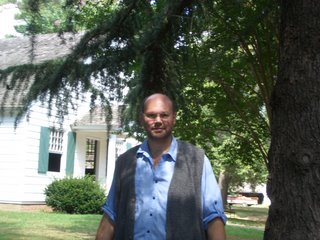Appalachian Grave

This is a story I wrote sometime last year. I would like to reserve all rights to this story but I hope you all enjoy it.
Appalachian Grave
by
Michael John Mullen
The Rocky Mountains are stunning, and there are those who have been to the heights and seen the soaring grandeur of the Continental Divide and think there can be nothing more beautiful. I have been afraid to take my wife there for fear she will find them so beautiful she would not want to come back to the East coast. The Appalachian mountains are not as tall, not as striking, not as new as the Rockies. Skiers disdain the Appalachians, and as a boy I felt the same. There was nothing marvelous about the green-covered hills of my home state. They were steeper than the hills of my native Iowa, but after seeing the Rockies I could never call them mountains.
Now the hills of West Virginia and Pennsylvania and all the other states that touch the Appalachian range are no less wondrous, for all their differences are not necessarily shortcomings. The West Virginia hills have a grace, a quiet dignity that belies their simple appearance. They have seen the times of rocky outcroppings and jagged peaks, and are settled into a senescence not yet yielding to senility. They remain quiet and stalwart, even with great portions strip-mined away leaving cancerous scars which bring a silent grief to the few who see them every day.
While much of the Appalachian range is covered with trees and leafmeal and green moss, there are the occasional boulders that rise from the ground like new molars. Some flat, some anvil shaped, sometimes along hills or rivers and sometimes in the middle of an otherwise level clearing. These giant castles of my childhood became the back seats of my adolescence, having no ’57 Chevy to retreat to after a dance. I still smile a secret smile when I see one of these boulders, and I can see a pale brunette girl and remember tree roots that dug into my back but didn’t diminish the pleasure of those summer nights in June.
I was hiking with my father one early fall, getting the last camping trip into the year before the weather became too cold for this to be fun, when we stopped by a stream in the shade of one of these boulders. We released the dogs- held there by my father’s stern command, never by a leash- and they bounded off to find some deeper water. We sat and drank cold water from the canteens, filled in the stream before you needed filters, and ate the camper’s lunch of pepperoni and warming Colby cheese. My father ate the trail mix of dried fruits and nuts I never quite liked and we relaxed. These were the times I felt closest to the rest of the world; when there was no one else around.
After a break of no more than five minutes- any more would be lazy- we hoisted our packs and I walked around, calling the dogs. I walked around the other side of the boulder as they came running toward me, mouths dripping with water and bits of leaves stuck to the ends of their tongues. Under the anvil-like outcropping of the boulder I saw a rough wall, about three feet high, eight feet long, and four feet wide. It was bordered on one side by the boulder, which sheltered the space inside. When I looked closer I could see a headstone, and the markings were remarkably clear. Most old headstones of this type were unreadable as the rain and wind wore them smooth, but in the lee of the stone even the wind would not erase the name. I could see clearly:
Keith Adkins
Born 1845
Murdered 1863
I didn’t know what to make of it. I called my father, and he took some pictures of the grave. I have always been fascinated by cemeteries, and this was a mystery too real for me to forget. We talked into the night by the campfire, and wondered who the young man might have been and what were the circumstances of his death. He might have been murdered by a rival or by a thief. He might have been killed in the War, and his distraught family may have considered his death murder. This was the time in West Virginia when the Northwestern 55 counties of Virginia returned to the Union they never really wanted to leave. This boy may have work Blue or Gray, and his family may have considered the opposing Army murderers, whichever side they were on.
As I drifted off to sleep I thought of the ballad of the Long Black Veil, and about the woman who expiated her sin by wandering the hills in such a veil to mourn the death of her lover, hanged for a murder he did not commit. He was in bed with this woman at the time, but she was married to his best friend. This unlucky man could not provide an alibi and went to his death seeing his lover in the crowd, who watched him hang without a tear in her eye. I thought about the old song, and wondered if this could have been the murder victim. Only as a grown man (and after the introduction of the Internet) would I learn that the story was fiction, based on the murder of a New Jersey priest and the woman who visited Rudolph Valentino’s grave in a long black veil. The song was written in 1959 by the same men who brought us the story of Big Bad John.
Family legends live on, and can acquire more reality than the true stories of those times. We have the legend of my ancestor who came over from Ireland to fight in the war, and landing in Boston, fought for the Union. He was wounded at Shiloh, and married his battlefield nurse. I was told over and over as a boy how Florence Nightingale chose her nurses from the homeliest women around, as she did not want the men to fall in love with them and take them away. I remember seeing the picture in the oval frame, the early photograph with pen lines drawn to provide clarity in those places the focus failed to give distinction, and thinking that yep, she was homely. However, she was not a nurse; this was America Ann Wallace previously Ballangee previously Lafleur, who married Andrew Wallace, another Irishman who died in a train accident. His legend was that America Ann never tried to claim any compensation for his death, as he had a habit of taking off for a month long binge every once in a while and she did not know if her husband was traveling with a ticket.
Somewhere my father may have the photographs taken that day, and I might be able to look up the county records to find the details of the young man’s death. It is even possible to find the facts without leaving my house, armed with a high speed internet connection and a credit card, but I doubt I will find anything so true to my heart as the wonder and speculation of that afternoon in the woods.


0 Comments:
Post a Comment
<< Home